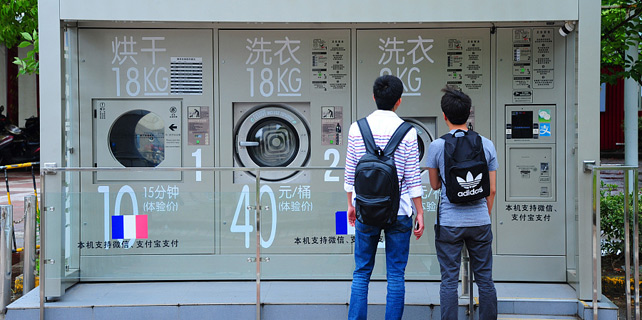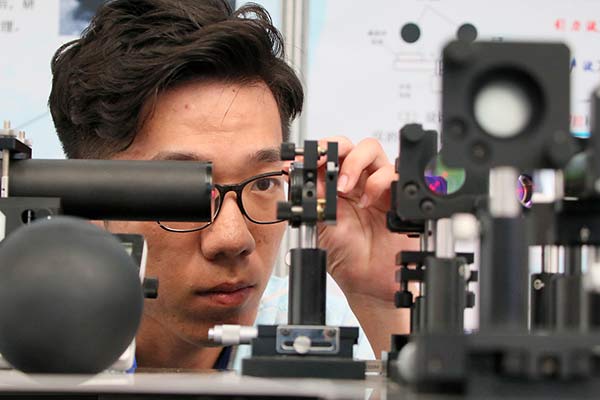

Measures to cut government interference, give more power to market and society
China's new leadership has taken measures to further cut government interference in the economy and streamline services, a major step forward in giving market forces more power.
The key to transform government functions lies in delegating more power to the market and society, while cutting government approvals is seen as a breakthrough toward achieving that goal.
Approval previously required for 133 types of undertakings, ranging from building an F1 formula car racing circuit to companies investing in large oil and gas fields, was either surrendered to the market or delegated to lower level authorities, the State Council announced in May.
The National Development and Reform Commission, China's major economic policymaker, saw its approval authority massively reduced, giving up 26 business activities, including expansion of civilian airports, ethylene or paraxylene plants, paper pulp manufacturing and the production of sugar and polyester.
A list of items previously subject to central government approval are to be delegated to local governments, including investment in wind power plants, hydropower stations on some rivers, potash fertilizer plants, rare earth processing mills and construction of oil and gas pipelines within a province.
The moves follow Premier Li Keqiang's pledge to streamline the government since he took office in March. He earlier said he plans to cut at least one-third of the central government's 1,700 approval requirements in five years.
In a speech at a State Council meeting on May 13, Li stressed that streamlining of the Cabinet will continue just as "an arrow sees no return once it is shot from the bow".
The changes were welcomed by economists as an effort to lower the threshold for investors to enter more industries.
Niu Li, senior economist with the State Information Center, a government think tank under the NDRC, said reduction and decentralization of approval requirement is a key part of the government's roadmap for progress on China's economic reform.
"The list is a good sign for both domestic and international investors and is likely to unleash new energy at corporate levels," Niu said.
In the State Council meeting in mid-May, Li said the central government will shift its focus on improving the environment for development, offering better public services and maintaining social fairness and justice, while allowing market forces to play a bigger role to unleash creative energies.
The government should work toward achieving a "small and efficient government", said Kuang Xianming, a researcher at the Hainan-based China Institute for Development and Reform.
"If the government hands over more power to the market and society, it could in turn get more revenue, such as tax revenue. Instead, too much power wielded by the government over the market could constrain economic development," Kuang said.
Yet market-based solutions cannot automatically solve all the problems facing a large developing country like China, said Hua Sheng, honorary dean of the school of economics and management under Southeast University in Nanjing, Jiangsu province.
Hua was on a key research body under the Chinese Academy of Social Sciences in the early years of reform in the 1980s.
"Maintaining a 1 percent or 2 percent growth rate was not bad for the United States and Europe, both free-market economies, indicating market forces alone do not necessarily bring economic growth or upgrade industrial operations," he said.
The success of China's economic reform should be achieved by concerted efforts made by both market forces and the government, he said.
Recent economic data were soft. China's economic growth slowed in the first quarter to 7.7 percent. The HSBC purchasing managers' index for May fell to 49.6, the first contraction since October.
Some economists have lowered their growth outlook for the year but most still think the 7.5 percent, growth target by the government this year is within reach.
Policymakers are under pressure to restructure the economy and improve people's well-being by addressing a slew of issues ranging from air pollution to overcapacity and local government debt.
The government may show more tolerance to slower expansion to solve problems such as environmental deterioration.
Economists have said the new leadership is working on a package involving economic and financial reforms and major decisions are expected to be made at a Party meeting in October.
"A reform roadmap covering all aspects is not feasible," said Hua, adding the roadmap should come with tangible targets and clear breakthrough points.
The most critical challenges facing the economy are to upgrade its industrial operations, adjust its economic structure and reduce redundant capabilities. The problems can only be addressed through mergers and reorganization by leveraging the capital market. Administrative interventions will be ineffective.
At the same time, the government should prioritize pricing reform of critical energy and resource products. The overcapacity problem has taken its toll on China's economy. But given the low electricity price, it's difficult for the government to resolve the issue.
The NDRC cannot oversee if local governments and enterprises want to launch energy-guzzling projects, but prices will be an effective lever for pushing enterprises and consumers to make adjustment, Hua said.
Dealing with overcapacity was set as a priority for economic restructuring and rebalancing by the central government.
Traditional industries such as steel, cement, electrolytic aluminum and plate glass suffered a low capacity utilization rate of around 70 percent to 75 percent in China, while the regular utilization rate overseas is around 10 percentage points higher, according to the NDRC.
Overcapacity also troubled China's emerging solar and wind industries, with solar seeing a capacity utilization rate of 60 percent and the wind turbine industry's rate at less than 70 percent.
The mild inflationary pressures have given room for the government to accelerate pricing system reform, "the longer to wait, the less likely it will happen", Hua said.
The consumer price index rose 2.4 percent in April, according to the National Bureau of Statistics, below the government's annual goal of 3.5 percent. Inflation is likely to remain at 2.4 percent in May, according to a note from the Industrial Bank Co.
Urbanization has been seen by leaders as the driver unleashing enormous consumption potential and investment demand in the coming years.
Urbanization is a complex and big project that will trigger profound changes in the economy and society. It needs to be supported by integrated reforms in many different areas, Premier Li said in mid-May at a news conference.
Local governments need to be given power to issue bonds, help cope with the financing bottlenecks and reduce reliance on land sale revenues, Hua said.
"Local governments need to be relieved from the bad debt mire, otherwise it will get bigger and bigger like snowballs," he said.
Issuance of debts should be approved by the local legislatures. Performance of local governments should not only be evaluated by how much GDP has been created, but what the cost was, Hua said.
lanlan@chinadaily.com.cn
(China Daily 06/06/2013 page28)
 Live streaming boosts zongzi sales
Live streaming boosts zongzi sales
 Big Data Expo opens
Big Data Expo opens
 Smart sharing washing machines available in Shanghai
Smart sharing washing machines available in Shanghai
 Innovative designs highlight industrial design week
Innovative designs highlight industrial design week
 Smart tech to shake up delivery industry
Smart tech to shake up delivery industry
 Chinese youths showcase innovative talents at tech competition
Chinese youths showcase innovative talents at tech competition
 Butterfly wings to inspire new solar power technology
Butterfly wings to inspire new solar power technology
 Singapore dealership sells luxury cars in 15-floor vending machine
Singapore dealership sells luxury cars in 15-floor vending machine